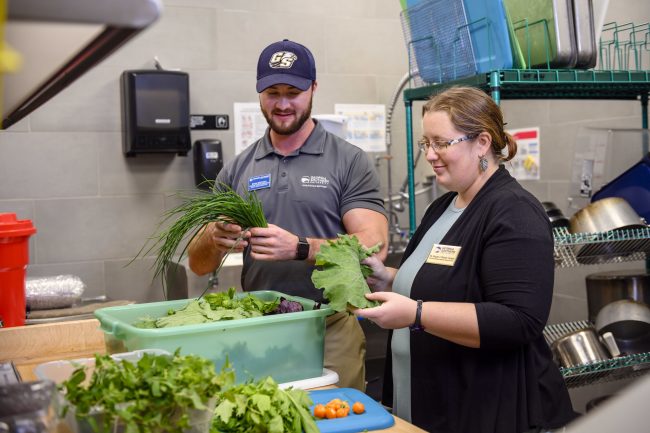
The newest restaurant on the Georgia Southern University Armstrong Campus offers diners comfort in knowing that some of the ingredients were grown just a few hundred yards away in the campus’ aquaponics farm in the Sustainable Aquaponics Research Center (SARC).
The agriculture and food industry is one of the largest users of water and producers of greenhouse gas emissions, but growing food by using aquaponics, a system of growing produce by using water fertilized by fish, cuts down on both significantly.
“SARC produce only travels a quarter mile from where it’s grown,” SARC curator Brigette Brinton said. “Locally grown food offers large advantages in terms of increased sustainability and freshness, and SARC produce is grown organically and using sound ecological principles that minimize water consumption.”
Brinton said minimizing emissions and water use does not diminish the quality or taste of the produce. To the contrary, it makes the food taste better because aquaponics produce often has higher concentrations of various compounds that give the foods their flavor, and they are grown in more ideal environments.

Although the dining hall on the Armstrong Campus has been using vegetables and produce from SARC since 2018, Southern Cafe will feature the products as a centerpiece of the restaurant. Availability of aquaponics produce, however, will depend on what is in season.
“President Marrero’s strategic plan directly speaks about sustainability, and we’re able to do that through our relationship with the aquaponics farm,” Ryan Brzycki, Assistant Director of Eagle Dining services, said. “After hearing feedback from the students, we’ve also tried to position Southern Cafe as a leader on campus in regards to using eco-friendly products for all of our containers and disposables, so that’s another huge impact we can make on this campus.”
The restaurant, which is located in the University Court area of the Memorial College Center, will have counter service and serve classic, southern dishes, such as Brunswick stew and chicken pot pie, as well as soups, salads, paninis and desserts. Brzycki said the Southern Cafe will focus on two other strategic pillars, teaching and research and community engagement, in addition to sustainability.
“Students and faculty are actively involved in research at that facility, and you can take a tour of it,” Brzycki said. “As people find out about Southern Cafe’s partnership with the aquaponics farm, we can further engagement by teaching people about what aquaponics is and how it can be used.”
Brzycki said Eagle Dining wants to expand on using ultra-local, fresh produce and vegetables, as a part of the partnership with the aquaponics farm.
“When we consider redesigns of existing or new dining locations on the Armstrong Campus in the future, we want to see how we can incorporate these same principles,” he said. “But for now, Southern Cafe is the flagship unit for the aquaponics partnership, as well as sustainability and healthy eating, of Eagle Dining.”
Brinton said she hopes the Southern Cafe will inspire the students, faculty and staff who eat there to make healthier and more sustainable choices in other areas of their lives.
“Showcasing local, sustainable produce increases students’ awareness that there are better options, and Georgia Southern is going the extra mile to show them how to start making better choices,” she said. “Each time students see they made a sustainable choice at the Southern Cafe, they’re more likely to choose sustainable options on their own.”
Information from Georgia Southern University.


Bulloch Public Safety
06/12/2025 Booking Report for Bulloch County

Chattooga Schools
Small Towns Grow Big Ideas: A Scientist’s Journey from Chattooga to Duke

Chattooga Local News
Mr. Christopher “DJ” Chapman Obituary

Bulloch Public Safety
05/27/2025 Booking Report for Bulloch County

Bulloch Public Safety
06/09/2025 Booking Report for Bulloch County

Bulloch Public Safety
06/02/2025 Booking Report for Bulloch County

Bulloch Public Safety
05/19/2025 Booking Report for Bulloch County

Bulloch Public Safety
05/16/2025 Booking Report for Bulloch County









